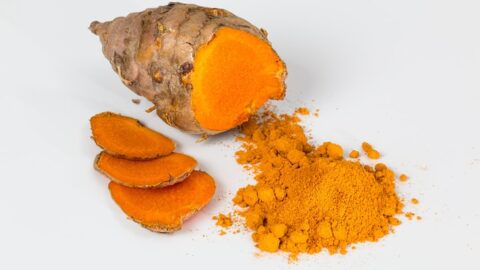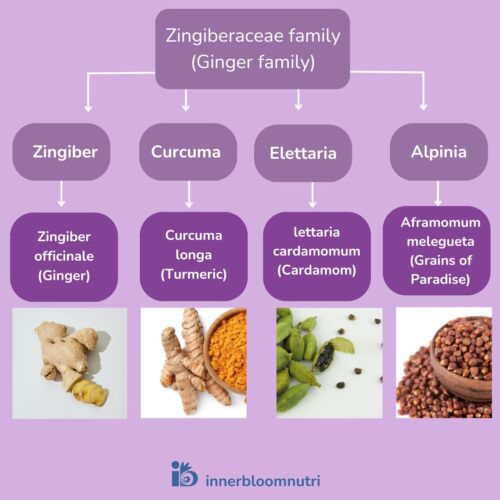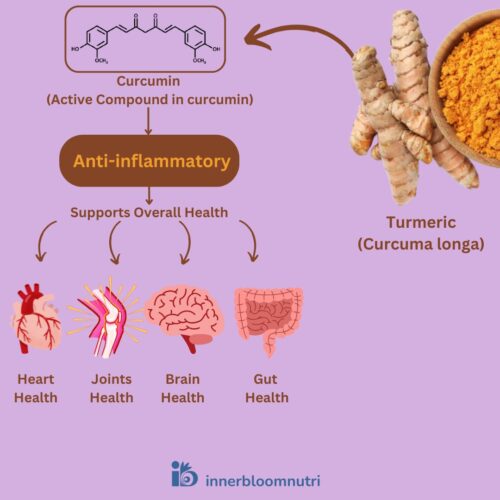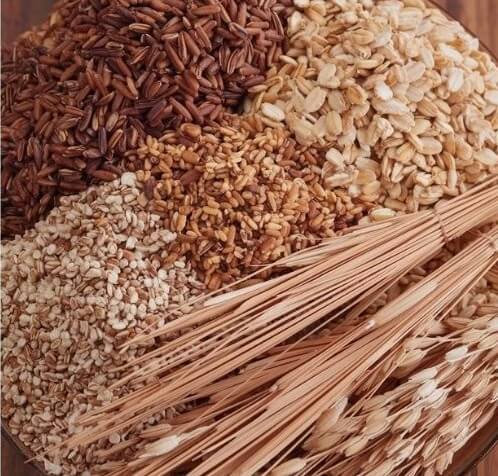
Turmeric ( Curcuma longa ), a vibrant golden spice, has a history that spans thousands of years.This member of the ginger family (Zingiberaceae), alongside its close relative ginger, thrives in tropical climates. Beyond its culinary appeal, turmeric has been revered for its medicinal properties for generations, and modern science is now validating its potent health benefits. (1) (2)
turmeric :From Curcuma longa to the Ginger Family: A Botanical Overview

Turmeric (Curcuma longa) is a beloved spice, but its story extends far beyond the kitchen. As this infographic illustrates, turmeric belongs to the Zingiberaceae family, commonly known as the ginger family, a diverse group that also includes ginger (Zingiber officinale), cardamom (Elettaria cardamomum), grains of paradise (Aframomum melegueta), and numerous other species. While Curcuma longa is the most widely recognized for its health benefits, especially because of its curcumin content, the Curcuma genus itself encompasses numerous other species, such as Curcuma zedoaria (white turmeric) and Curcuma mangga (mango turmeric), each with unique properties and traditional uses. Understanding these botanical connections not only deepens our appreciation for turmeric but also highlights the rich diversity within the plant kingdom. It is important to note that while there are many species in the Zingiberaceae family, not all contain high levels of curcumin, and that the image shown is not a complete representation of all the species within the family.
The Power of Curcumin: Turmeric's Key Compound
The key to turmeric’s remarkable properties lies in its primary active compound: curcumin. This powerful polyphenol gives turmeric its distinctive color and is responsible for its impressive array of biological activities. Curcumin is a potent anti-inflammatory and antioxidant, and research suggests it may play a role in managing a range of health conditions. (3)
Health Benefits of Turmeric (and Curcumin):

Curcumin’s influence on the body is multifaceted, targeting multiple signaling pathways at the cellular level. This broad action contributes to its potential benefits in:
- Inflammatory Conditions: Studies show that curcumin, the active part of turmeric, is highly effective at fighting inflammation. This is significant because many chronic health issues, like arthritis and IBD, are rooted in excessive inflammation. Curcumin works by modulating the body’s inflammatory response, which can alleviate pain and swelling in joints (arthritis) (4) and soothe gut irritation (IBD) (5). Furthermore, curcumin may support cardiovascular health by reducing inflammation and oxidative stress, and aid in pain relief and improved joint function in osteoarthritis.
- Metabolic Syndrome: Curcumin may help manage metabolic syndrome, a cluster of health problems, including inflammation, high blood sugar, abdominal fat, and unhealthy cholesterol levels. By positively influencing metabolic function, curcumin could reduce the risk of heart disease and diabetes, common complications of this syndrome.(6)
Cognitive Function: Ongoing research is exploring curcumin’s potential role in protecting against age-related cognitive decline and supporting brain health.(7)
- Exercise Recovery: Curcumin may help reduce exercise-induced inflammation and muscle soreness, potentially enhancing recovery and performance.(8)
Maximizing Turmeric's Benefits: The Bioavailability Challenge and the Black Pepper Solution:
Curcumin’s major drawback is its poor bioavailability. The body struggles to absorb and utilize it effectively. However, nature provides a solution: black pepper. Piperine, the active compound in black pepper, dramatically enhances curcumin’s bioavailability, sometimes by as much as 2000%. Combining turmeric with black pepper is therefore crucial to maximize its health benefits.(9)
How to Incorporate Turmeric ?
- Cooking: Add turmeric powder or fresh turmeric root to your favorite dishes, including curries, stews, soups, and stir-fries.
- Turmeric Latte (Golden Milk): Combine turmeric with milk (dairy or non-dairy), black pepper, and other spices like ginger and cinnamon
conclusion:-
Turmeric , with its rich history and potent health benefits, offers a natural way to support overall well-being. From its botanical origins in the Zingiberaceae family to the powerful effects of curcumin, this golden spice has much to offer. While research continues to explore its full potential, incorporating turmeric into your diet can be a delicious and beneficial addition to a healthy lifestyle.

